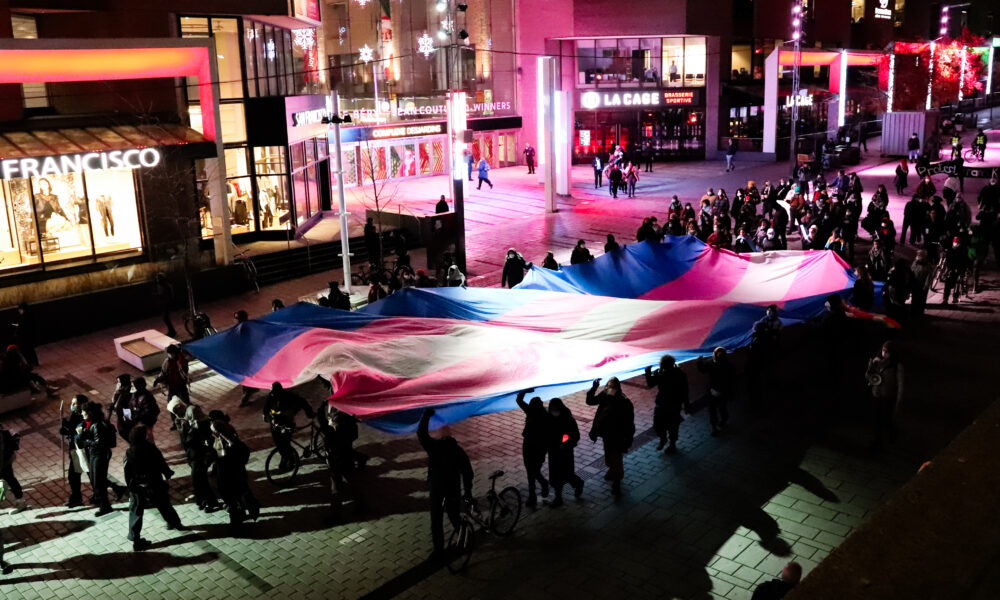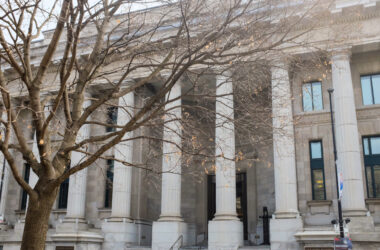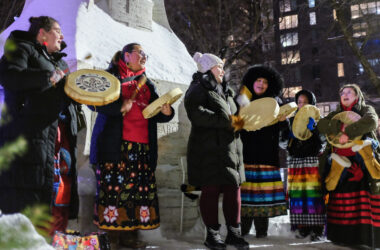Over a hundred people gathered on the evening of Nov. 20 to mark Transgender Day of Remembrance, an annual observance that serves to honour and remember transgender people who have lost their lives due to transphobia and discrimination. The event, organized by a group of Montreal activists, began with a vigil and series of speeches at Dorchester Square, followed by a march that weaved through downtown Montreal and the Village and ended in front of the Radio Canada headquarters on Avenue Papineau.
“Trans Day of Remembrance is an especially important event for the trans community because it faces a higher mortality rate – simply put, trans people tend to often have community members to grieve, and it is deeply meaningful to do it as a community,” Quebec Public Interest Research Group (QPIRG) wrote in an email to The Tribune.
Following the election of Donald Trump, whose campaign focused heavily on anti-trans policies and transphobic rhetoric, anxiety about increasing American and Canadian legislation against trans rights was palpable.
“It’s devastating news for trans people who live in the US,” added Celeste Trianon, a jurist and activist for trans rights in Montreal, in an interview with The Tribune. “Trump has fully gone down the rabbit hole of attacking trans people as much as he can, especially trans women.”
The organizers also recognized the ties between trans rights activism and Palestinian human rights.
“We, as queer and trans people, have been able to work within the pro-Palestinian movement to fight for liberation and an end to genocide,” a representative from the Divest for Palestine Collective said, addressing the crowd. “Not only that, but also to knit a larger web of solidarity between our struggles, which all converge together.”
While many of the speeches reiterated the need for continued solidarity and activism, they also emphasized Trans Day of Remembrance as an opportunity to make space for mourning, rest, and community support.
“I’m thankful for each and every one of you who’s here today to remember and honour the siblings who have lost due to transphobia,” said Montreal-based activist Alice Winterland, addressing the crowd. “Let us mourn those we’ve lost today. Let us celebrate their lives, and finally, let us find solidarity amongst each other and other queer people in the community.”
Recognizing the difficulty of a day for mourning, several volunteers were designated as active listeners for anyone who needed to discuss feelings brought up by the day or the event. They additionally provided free food, encouraged attendees to wear masks, and supplied wheelchairs for those who needed them during the march.
After the speeches and food, protestors unfolded a large trans flag, which spread from one side of the street to the other. They marched along Sainte Catherine Street through downtown Montreal. As the protest moved through the Gay Village, people spilled out of clubs and restaurants to join in with the chanting, joining in for refrains like “We’re here, we’re queer! We’re fabulous, don’t fuck with us!” and “Fight for Black trans women!”
Finally, the protestors arrived at the Radio-Canada headquarters on Avenue Papineau, where they called on the organization to increase their support for trans-Canadians and report more actively on trans issues, with chants like “Every time the media lies, another trans kid dies!” Celeste noted that there were no mainstream media organizations covering the protest.
“It shows how trans rights are represented in the media as an issue that is not worthy of reporting, that trans lives are not worth reporting on,” she told The Tribune.
A representative from the Union for Gender Empowerment also spoke about the importance of events like this to break the silence surrounding the mistreatment of trans individuals.
“The amount of violence that occurs in our lives, whether it’s social violence, whether it’s what sociologists call deaths of despair, whether it’s interpersonal violence, […] all of these things occur very quietly, to the ears of the outside world,” they shared in a voice memo to The Tribune. “Trans Day of Remembrance is about claiming that, it’s about saying these things actually do occur. They’re occurring to us. And they deserve to be remembered, right here, right now.”









